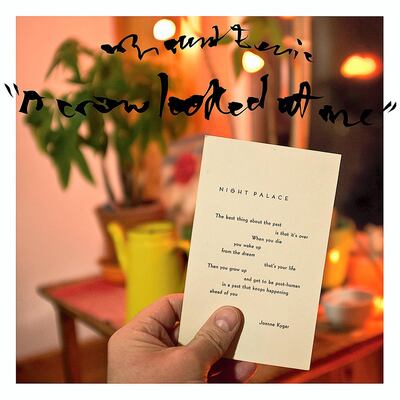It says something about singer-songwriter Phil Elverum's artistic path that he only became known to the wider public – after a two-decade career – when he married American actress Michelle Williams in a discreet ceremony last summer.
Headlines asked: "Who is Phil Elverum, Williams's new husband?"
Save for this rather unlikely turn of events, Elverum and his massive body of work – first recording and performing with collaborators as The Microphones, and since 2003 solo as Mount Eerie – would likely have remained the underground phenomenon he had always been.
An honest account of personal grief
He has an incredible catalogue of 40-plus albums meditating on life, death, nature, love, poetry and art. Having followed his work for the past 20 years, it was surreal seeing his name in the showbiz press – not least because his most recent albums have been some of the most radically honest and difficult to listen to of all. And yet, they are universal in the truths they speak of, on the devastating turmoil of personal grief.
Elverum's wife, Genevieve Castree, died of pancreatic cancer in 2016, when their daughter was only 18 months old. In trying to understand and process that pain, almost accidentally, Elverum rendered it into words, and released an album, A Crow Looked At Me, entirely about his wife's death. Then, last year, another one, Now Only. "I made my inner monologue into songs for no other reason than to release it from my skull," he said by way of explanation.

This form of raw catharsis also took him on an "unusual, unexplainable and great" tour in 2017 and 2018, and now he has released a remarkable live album, (after), which is a recording of one of these concerts held in the intimate surroundings of a church in the Netherlands. "You were thinking ahead to a future you must have known, deep down, would not include you," Elverum sings, "though you clawed at the cliff you were sliding down, being swallowed into a silence that is bottomless and real." The album is a graphic, emotional message of a man who "stands untethered" – and the precarity with which he barely keeps it together in this live performance is part of what makes it so transfixing. He describes the days and months after Castree's death with incredible candour: the mundanity, poetry and pain as life somehow, implausibly, continues.
A unique style and voiceIt would be tempting to fall into journalese and call this rare body of work "unflinching" – but that wouldn't be true. Elverum flinches – vocally, lyrically, in his spirit.
A unique sound and style
Death is "not for singing about", he sings in a song about death. "When real death enters the room, all poetry is dumb," he continues. Artistic expression as candid self-therapy is not a new idea, but nor is it an uncomplicatedly good idea (either for the singer or the song) – and Elverum knows this very well. He worries, extensively. In a statement accompanying the release of (after), Elverum spoke of "so many apprehensions and uncertainties".
And yet, people responded – reviews were glowing. We wanted to hear his words, and we recognised our own grief in his. In the live show, Elverum's voice is accompanied solely by his acoustic guitar, and the delicate picking and occasional strums echo out into the venue, their frailties without a filter. Death is not an abstraction, as it has been on many of his (superb) earlier albums. There is a Leonard Cohen-esque quality to tracks like the low-rumbling melancholy of Ravens, in which he briefly waits for his wife to return. But really, Elverum's style and voice is unique, honed over such an extensive and captivating back catalogue, and it's hard to draw comparisons with other singers
.
The album peaks with the profound 11-minute track Distortion – the original studio version, like much of Elverum's back catalogue, begins with and is pockmarked by bursts of guitar distortion, a hum that he manages to make feel organic and human. But in this stripped-back live version, the stirring reflections on mortality and the legacies we leave are captivating. It grapples with the idea that our "complex intentions and aspirations do not matter at all / in the face of the crushing flow of actual time".
Across Distortion's six verses, Elverum takes us back, from childhood conversations with his mother about death and on to the most beautiful tribute to Castree, a woman who "told the hard truths". This visceral journey through time ends with the heartfelt reassurance that, in spite of everything, "in my tears right now, light gleams"
.
It's the kind of song, and performance, that makes you feel like you may need to sit down, take a deep breath or three. How Elverum got through singing it to a reverent audience is anyone's guess.
Prior to the last song, he stutters, pauses, and loudly exhales. Then pauses again. “That was intense,” he says, with great understatement.
"This was an amazing show." A single voice shouts "thank you" from the audience. It's a sentiment hard not to share.


